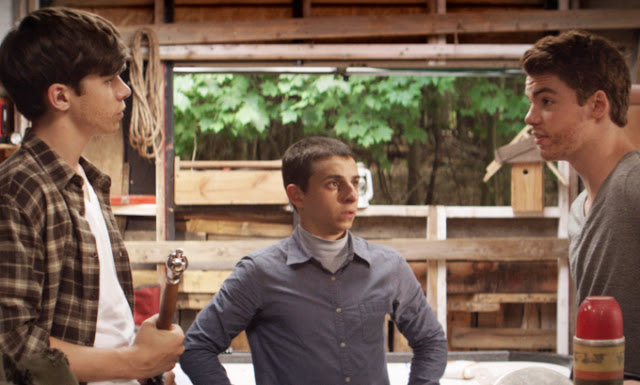Culture
“Kings” of their own world

The Kings of Summer
dir. Jordan Vogt-Roberts
Release Date: Jun 07, 13
- 1
- 2
- 3
- 4
- 5
- 6
- 7
- 8
- 9
- 10
Every kid, at some point, wants to run away. Sometimes it’s because of a legitimately traumatic home life, sometimes it’s just youthful melodrama. Sometimes it’s because you read too many Boxcar Children novels in your elementary school, and most of the time it simply grows out of the yearning for freedom. The lack of obligation, the ability to fend for yourself, the blissful ignorance of how truly hard it is to live without rule when you’re too young to possess the basic wherewithal to survive in solitude. Eventually you get to high school, and read Walden, and either you end up full of yourself and become a twentysomething who talks about living in the woods while decrying the “sheeple” that surround you every day, or you give up the ghost and live alone through more conventional means, with rent and bills and all the less savory aspects of flying from the nest therein.
Or, you become the trio from first-time filmmaker Jordan Vogt-Roberts’ The Kings of Summer, and you do it yourself for as long as you can possibly manage. Joe (Nick Robinson) grows tired of dealing with his father’s (Nick Offerman) grieving process for his wife and Nick’s mother. Patrick (Gabriel Basso) is the offspring of unbearably protective, dweeby suburbanites (Megan Mullally and Marc Evan Jackson). And Biaggio (Moises Arias)…he’s just there, and neither Joe nor Patrick have the courage to make him leave; as Joe points out, they “don’t know what he’s capable of.” The three find a place in the woods outside their town to build their own private sanctum, and run away from home, determined to prove their manhood by catching their own food and living their own lives. Granted, this involves a few “hunting” excursions to Boston Market, but who’s really counting?
The Kings of Summer invokes quite a few films, most notably last year’s Moonrise Kingdom (however unintentionally), and more generally every indie seriocomedy from the 1990s forward. For the most part, this isn’t a bad thing. Writer Chris Galletta has an acute understanding of this weird universe, in which the parents are just as acerbic as the kids and Biaggio is far too delightfully weird to survive in most actual high schools, and captures the feeling of infinite power that comes from summertime adventures, when one is young enough that running away, reconciling with one’s family and growing up can happen in the span of a few humid months. Robinson communicates this best as the scrawny, soulful lead akin to the leads of so many other Sundance movies, obsessed with his dream girl (Erin Moriarty) and devastated when their handmade paradise leads to her attentions moving elsewhere. Offerman, too, delivers stirring work as a grieving parent; when he goes fishing with Patrick’s father and contemplates Joe’s motivation for running away, he’s just as impressed by his son’s joyful sense of anarchy as he is frustrated by their inability to connect.
The film, however, isn’t always so pensive. Vogt-Roberts often seems unsure of which style he wants to apply, and so shifts rapidly throughout; the twee early scenes eventually give way to pensive downward spirals and life-threatening illness, interspersed with bits of asynchronous comedy throughout. Sometimes this works, as in a late-game showdown with a deadly snake, but at others his attentions move so quickly that characters seem to disappear from the movie at will and motivations change wherever convenient. (Among others, Allison Brie’s turn as Joe’s sister is neither brief enough for comic relief nor substantial enough to amount to much.) The score, too, moves between chirpy and forlorn with unneeded frequency. And yet, if you simply let the warm rhythm of the film absorb you, it’s difficult not to appreciate a film that’s every bit as charmingly scrappy and DIY as the ramshackle house its protagonists put together.